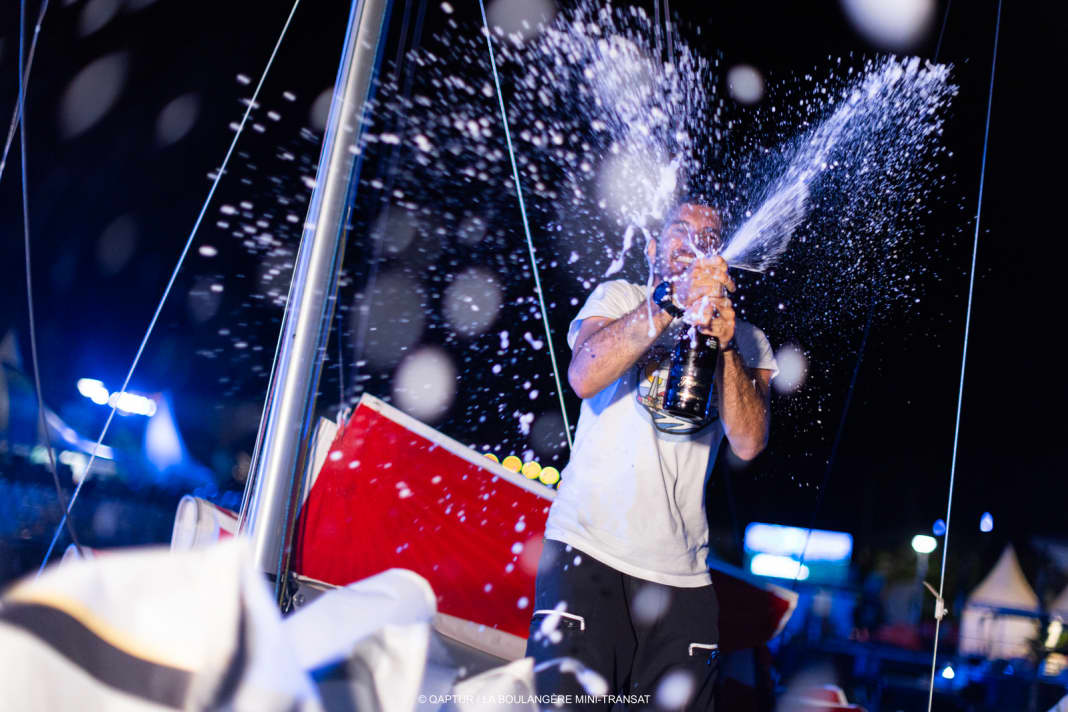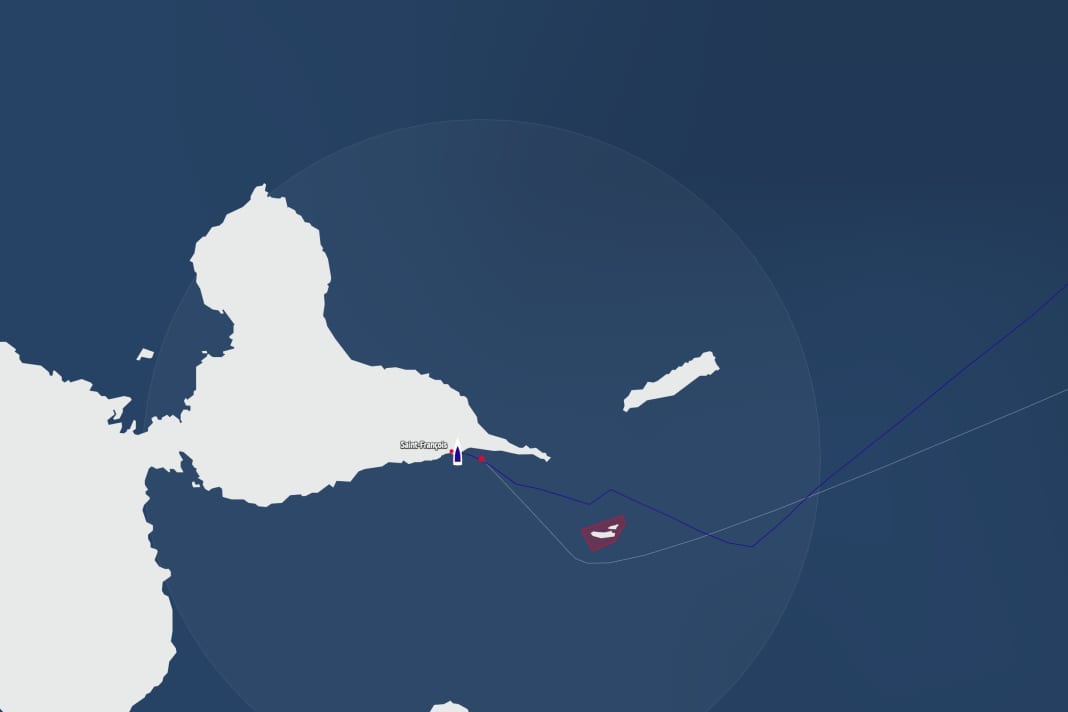La Boulangère Mini Transat: Dramatic finish in the series minis - "I didn't read the sailing instructions properly"
Max Gasser
· 13.11.2023






After arriving in Guadeloupe at 1.26 a.m. on Saturday night, Luca Rosetti still had no peace and quiet. Instead, the anxiety, speculation and calculations began - would it be enough for overall victory? His direct rivals had to cross the finish line with a bigger gap than he had achieved on the first stage, when he had only finished eighth. And at over 15 hours behind the Belgian Michaël Gendebien, the gap was anything but small.
But Rosetti had sailed an incredibly confident race on the second leg, everything seemed possible: "I was very satisfied with how I managed my race and felt I had done a good job, which was very important to me." Yesterday lunchtime brought the unbelievable certainty: the 32-year-old is the winner of the 24th edition of the La Boulangère Mini Transat in the series classification.
Proto winner tooFederico Waksman overcame a significant deficit:
"This victory is a great reward! I couldn't have wished for a better end to my four years in the Mini 6.50!" said Rosetti. He had already completed a Mini Transat in 2019, but in the Proto class and with the adventure in focus. Now he was much more ambitious at the start: "This time I was fully focussed on performance and not on the adventure aspect. I made no secret of the fact that I was aiming for victory."
Soon against Burke and Fink: Mini-Transat winner Rosetti wants to enter Class 40
This not only makes him only the eighth winner of the series class who is not from France, but also the second Italian to achieve this feat. In 2019, it was his compatriot Ambrogio Beccaria who stormed to the top. The latter is now an established name in the Class 40 and is one of the big favourites in the current Transat Jacques Vabre. This is also where Rosetti wants to go, as he said himself: "I would like to sail Class 40 and have started working on my project. I know that this event (the mini-transat, editor's note.) is a remarkable stepping stone." German youngsters Lennart Burke and Melwin Fink also took this path after their time in the Mini.
Rosetti has now also proven his undisputed ability in the Mini-Transat. He was also at the front for a long time on the first stage. However, the route he chose to the east did not pay off in the end, instead it was Michaël Gendebien who triumphed on a very direct course.
With the start of the second stage, Rosetti then battled against a 15 hour and 5 minute deficit. "If the trade winds had prevailed right from the start, we would have all committed to the trade winds and it would have been a speed race in which it would have been impossible to really make a difference," explains the Italian. But things turned out differently. "When I realised that there were two strategic options after El Hierro, I knew I had a chance."
Strong decisions: the path to victory
After a good start, the 32-year-old had dropped back to the rear of the midfield at this point, but the field was close together and Rosetti took his chance: "I decided in favour of the northern variant, and that proved to be a success!" He never let up, always went full throttle and, above all, made the right decisions. The Italian always stayed in the northern group of the field, but also never missed the jump when it was time to head further south. "In general, everything went well and I didn't have any major technical problems. Of course, I also experienced some difficult moments. That's normal when you're alone at sea for 14 days," said the overall Mini-Transat winner at the finish.
In any case, there weren't too many of these moments, as Rosetti led the field almost continuously from 1 November onwards and was never worse than third place. Otherwise it would hardly have been possible to relativise the seemingly insurmountable gap. But Rosetti went one better and clocked up almost three and a half hours more than would have been necessary. "It's relatively indescribable," he said after his victory became clear, "what I feel is not easy to express."
Winner of the first leg makes a fatal mistake - "I didn't read the sailing instructions properly"
As great as the victory is for Rosetti, the abrupt end must be terrible for the Belgian Michaël Gendebien, who had won the first leg. Although he was unable to fully confirm his excellent starting position early on, he continued to sail a good race. Shortly before the finish, however, a major faux pas occurred: the talented soloist passed a restricted area on the wrong side. "I didn't read the sailing instructions properly. I thought the area around the islands of Petite Terre was just a forbidden zone. I didn't understand that you had to leave them on the starboard side on arrival," he explained the serious mistake.
This could possibly have cost him a place on the podium in the overall standings. He is currently in fourth place, but it is not yet clear how the infringement of the rules will be punished, according to the organisers. The Belgian left the harbour shortly after his arrival to sail around the restricted area in the opposite direction and return to the finish. Whether intentionally or not, he broke another rule - he would have had to stay in the harbour for at least 12 hours for it to count as an official stopover. However, it is questionable whether you are allowed to make a repair stop or similar in the harbour, especially if you have already crossed the finish line.






Alpine country Switzerland on the offshore upwind - Felix Oberle sails a strong mini-transat
The fact is that the two Frenchmen Bruno Lemunier and Gregoire Hue are now on the podium instead of him, regardless of the jury's decision. The Belgian skipper reproaches himself: "I'm happy to have arrived in Guadeloupe and to have completed a four-year project, but of course it's emotional for me to bring things to a close in this way."
Swiss rider Felix Oberle was also in the fight for the stage win for a long time. He finished in fourth place and fifth overall. He crossed the finish line off Saint-François (Guadeloupe) early yesterday morning, his total time over the two stages is 25 days, 10 hours, 5 minutes and 56 seconds. "It's so cool to be here, to have crossed the Atlantic for the first time!" he said after his arrival. Contrary to the winner Rosetti, Oberle decided to take a radical southerly course after El Hierro. "I had my idea and it worked quite well," said the Swiss rider, who struggled with his power supply in the meantime.
In both classifications, the rest of the field is also approaching Guadeloupe. There are already 30 boats in the series minis, and more than 15 in the protos.

